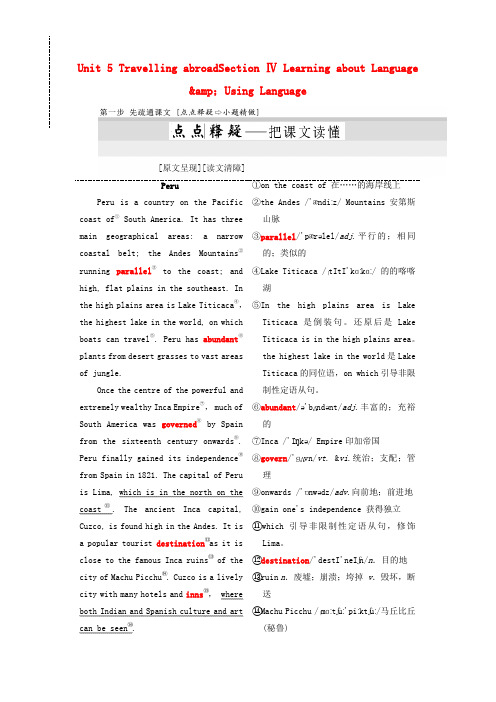2017-2018学年高中英语Unit5TravellingabroadSectionⅢGrammar_非限制性定语从句教学案新人教版选修7
- 格式:doc
- 大小:150.51 KB
- 文档页数:6

Unit 5 Travelling abroadSection Ⅳ Learning about Language&;Using Language[原文呈现][读文清障]PeruPeru is a country on the Pacific coast of① South America. It has three main geographical areas: a narrow coastal belt; the Andes Mountains②running parallel③to the coast; and high, flat plains in the southeast. In the high plains area is Lake Titicaca④,the highest lake in the world, on which boats can travel⑤. Peru has abundant⑥plants from desert grasses to vast areas of jungle.Once the centre of the powerful and extremely wealthy Inca Empire⑦, much of South America was governed⑧by Spain from the sixteenth century onwards⑨. Peru finally gained its independence⑩from Spain in 1821. The capital of Peru is Lima, which is in the north on the coast⑪. The ancient Inca capital, Cuzco, is found high in the Andes. It is a popular tourist destination⑫as it is close to the famous Inca ruins⑬ of the city of Machu Picchu⑭. Cuzco is a lively city with many hotels and inns⑮, where both Indian and Spanish culture and art can be seen⑯. ①on the coast of 在……的海岸线上②the Andes /'ændiːz/ Mountains安第斯山脉③parallel/'pærəlel/adj.平行的;相同的;类似的④Lake Titicaca /ˌtItI'kɑːkɑː/ 的的喀喀湖⑤In the high plains area is LakeTiticaca是倒装句。





Unit 5 Travelling abroad3. Grammar: 复习非限制性定语从句一、单句改错(定语从句专练)。
请找出下列各句中的错误并加以改正。
1. This is the factory where we visited last week.2. This is the watch for which Tom is looking.3. The person to who you spoke is a student of Grade Two.4. The house in that we live is very small.5. The sun gives off light and warmth, that makes it possible for plants to grow.6. I’ve read all the books which I borrowed from the library.7. This is the best film which I have ever seen.8. My father and Mr. Smith talked about things and persons who they remembered in the country.9. Everything which we saw was of great interest.10. His dog, that was now very old, became ill and died.11. The reason which he didn’t go to school is that he was ill.12. Those who wants to go with me put up your hands.13. The boy, his mother died last year, studies very hard.14. I have two sisters, both of them are doctors.15. We’re going to visit the school where your brother works there.16. He is the only one of the students who have been invited to the English Evening.17. That is the way which they work.18. Those have questions can ask the teachers for advice.19. Who is the man who has white hairs?20. I will never forget the days which we had a good time together at the sea.二、七选五根据短文内容,从短文后的选项中选出能填入空白处的最佳选项。
Unit 5 Travelling abroad Ⅰ. 单元教学目标Ⅱ. 目标语言Ⅲ. 教材分析和教材重组1. 教材分析本单元以Travelling abroad and studying abroad为话题,旨在通过单元教学,使学生了解在国外旅行或学习时可能会遇到的一些问题,并学会怎样去解决问题和避免这些问题的发生。
学会表达和支持个人观点,能用所学的有关travelling abroad的词汇描述在国外居住生活的情况;在国外旅游时能根据所提供的信息选择恰当的旅游线路,能推测哪些事情可能会发生,哪些事情不会发生,并会正确使用非限制性定语从句。
1.1Warming Up 提出了四个有关在国外旅行和生活的问题,让学生用已有的知识和经验讨论在国外居住或旅行会遇到什么问题,并且该如何解决这些问题。
1.2Pre-reading是Reading的热身活动,设置了两个问题,它要求学生采用与同学讨论交流的方式谈论在国外学习的利与弊,激发同学们的学习兴趣。
1.3Reading是一篇介绍中国女孩谢蕾在伦敦学习和生活的情况,让学生通过实例对比在国内学习生活与在国外学习生活的不同,从而培养他们的国际视眼。
1.4Comprehending设置了4个练习题:练习1通过四个问题来检查学生对课文细节的理解;练习2以图表的形式来分析在国外学习的利与弊;练习3设置了三个讨论题,通过对这些话题的讨论,挖掘文章的深层含义,激活学生自身的认知能力和思想认识能力;练习4是概括能力训练题,在理解文章的基础上,重点训练学生的概括能力和解决问题的能力。
1.5Learning about Language分词汇和语法两部分。
其中Discovering usefulwords and expressions是训练学生在语境中掌握词汇的能力,帮助学生加强动词变化形式的意识。
Revising useful structures 是对非限制性定语从句的复习,旨在帮助学生加强对定语从句的理解、掌握和运用,并通过语法练习加以巩固。
Unit 5 Travelling abroadSection Ⅰ Warming Up &;Reading-Pre-readingDuring early adulthood your worldview is still being formed.It's important to manage this time — to give yourself opportunitiesto grow. A good way to do that is to travel. There are three reasonsto travel while you're young:1.Travelling teaches you to live an adventureYou should take the time to see the world and taste thefullness of life. It's worth whatever investment or money or sacrificeof time required on your part. It's not about being a tourist. It's aboutexperiencing true risk and adventure so you don't have to live infear for the rest of your life.2.Travelling helps you encounter compassion (同情)Travelling will put you in places that will force you to care forissues that are bigger than you. If you go to Southeast Asia, youmay encounter (遭遇) the slave trade. If Eastern Europe, you may seethe effects of genocide (大屠杀) and religious persecution (宗教迫害).3.Travelling allows you to get some cultureWhile you're still young, you should get cultured. Get to know theworld and the magnificent people that fill it.There's nothing quite like walking alongside the Coliseum or seeingMichelangelo's David in person. I can describe the city of San Juan andits amazing beaches and historic sites to you, but you really have to seeit for yourself to experience it. You can read all the books in the worldabout the Great Wall of China or The Louvre, but being there is a different story.Section_ⅠWarming Up & Reading — Pre reading[原文呈现][读文清障]KEEP IT UP ①, XIE LEIChinese student fitting in ②well Six months ago Xie Lei said goodbye to ③her family and friends inChina and boarded a plane ④for London. ⑤It was the first time she had everleft her motherland ⑥. “After gettingmy visa ⑦I was very excited because I had dreamed of this day for so long. But I was also very nervous as I didn't know what to expect ⑧,” Xie Lei toldme when I saw her waiting ⑨in a queue ⑩at the student cafeteria ⑪between lectures ⑫.Xie Lei, who is 21 years old, has come to our university to study for a business qualification⑬. She is halfway through the preparation ⑭year, which most foreign students complete before applying for ⑮a degree course ⑯. Xie Lei highly recommends⑰it. “The preparation course is most beneficial ⑱,” she said. “Studying here is quite different from studying in China, so you need some preparation first.”①keep it up 保持优秀成绩;继续干下去②fit in 相适应;相融和③say goodbye to 跟……说再见 ④board a plane 登上飞机⑤句式“It is/was the first/second ... time+that ...”这是某人第一/二/……次做……(从句用完成时时态)。
Unit 5 Travelling abroadSection Ⅲ Grammar-非限制性定语从句语法图解探究发现用适当的连接词填空1.Xie Lei, who is 21 years old, has come to our university to study for a business qualification.2.She is halfway through the preparation year, which most foreign students complete before applying for a degree course.3.You have to get used to a whole new way of life, which can take up all your concentration in the beginning.4.Living with host families, in which there may be other college students, gives her the chance to learn more about the new culture.5.He wanted to know what I thought, which confused me because I thought that the author of the article knew far more than I did.[我的发现](1)以上句子皆为非限制性定语从句,从句与主句之间用逗号隔开。
(2)非限制性定语从句可以置于主句之中(如句1),前后有逗号隔开,也可以置于主句之后(如句2、3、4、5)。
(3)非限制性定语从句的先行词既可以是指人或指物的某一名词(如句1、2、3、4),也可指代整个主句的内容(如句5)。
一、非限制性定语从句的特点1.非限制性定语从句与先行词之间一般用逗号隔开,是对先行词的附加说明,如去掉,句子剩余部分的意思仍然完整。
The children, who wanted to have a journey, were disappointed when the journey was cancelled.那些想旅行的孩子,都因旅行的取消而感到失望。
That they will get married, which has not been announced, has spread around.他们要结婚的消息还没有被宣布,却已经被传得沸沸扬扬。
2.非限制性定语从句的先行词既可为单个的名词或代词,也可为整个句子或其中一部分,且常译成并列的分句。
We'll graduate in July, when we will be free. (先行词为名词)我们将于七月份毕业,到那时我们就自由了。
He often comes to school late, which makes his teacher angry.(先行词为主句的内容)他经常上课迟到,这使得他的老师很生气。
[即时演练1] 补全句子①(2016·江苏高考改编)Many young people, most_of_whom_were_welleducated,_headed for remote regions to chase their dreams.很多年轻人,他们中的大多数受到了良好的教育,都到偏远地区去追逐自己的梦想。
②(2016·浙江高考改编)Scientists have advanced many theories about why human beings cry tears, none_of_which_has_been_proved.就人类为什么哭科学家提出来许多理论,但没有一项理论得到过证明。
③(2016·天津高考改编)We will put off the picnic in the park until next week, when_the_weather_may_be_better.我们将会把去公园野餐的时间推迟到下周,那个时候天气可能会更好一些。
二、引导非限制性定语从句的关系词1.关系代词which指物,在从句中作主语,宾语或表语;who/whom指人,who在从句中作主语,而whom在从句中作宾语;as既可指人也可指物,在从句中作主语,宾语或表语;whose既可指人也可指物,在从句中作定语。
He wasn't unconscious, as could be judged from his eyes.他并未失去知觉,这从他的眼神可以判断出来。
Mr. King, whose legs were badly hurt,was quickly taken to hospital.金先生的腿受了重伤,他很快就被送去医院了。
2.关系副词when指代时间,在从句中充当时间状语,可与“介词+which”互换;where指代地点,在从句中充当地点状语,可与“介词+which”互换。
We will put off the outing until next Sunday, when/onwhich we won't be so busy.我们把郊游推迟到下个星期天,那时我们就不会那么忙了。
Yesterday, they went out to have a picnic in the park, where/in which they hada good time.昨天,他们出去在公园里野餐了,在那里他们玩得很开心。
[名师点津] (1)非限制性定语从句可将整个主句作为先行词,对其进行修饰,这时从句谓语动词要用第三人称单数。
(2)非限制定语从句中,不用why引导,用for which代替why。
He has been busy with his work the whole holiday, which has made his girlfriend unhappy.他一整个假期都忙于工作,这令他的女朋友很生气。
The reason,for which he was absent from the meeting, wasn't given.他为何缺席会议,没有给出任何理由。
[即时演练2] 用恰当的关系词填空①Yao Ming, as you know, is an excellent basketball player.②I wish to thank Professor Smith, without whose help I would never have got this far.③(2013·天津高考改编)We have launched another manmade satellite, which is announced in today's newspaper.④(2012·浙江高考改编)Ellen was a painter of birds and of nature, who,_for some reason, had withdrawn from all human society.三、as 与which引导非限制性定语从句时的区别众所周知,地球围绕太阳转。
The singer, as was expected, achieved a great success.正如所期盼的,这位歌手取得了巨大成功。
Catherine will attend a friend's wedding, which she is busy preparing for now.凯瑟琳将参加一个朋友的婚礼,现在她正在为此做准备。
[即时演练3] 选词填空(as/which)①(2014·四川高考改编)Until now, we have raised 50,000 pounds for the poorchildren, which is quite unexpected.②(2013·山东高考改编)There is no simple answer, as is often the case in science.③(2013·江苏高考改编)The president of the World Bank says he has a passion for China, which he remembers starting as early as his childhood.④As we all know, he is a gifted pianist.四、限制性定语从句与非限制性定语从句的区别When you reached the village, you would first find a house whose windows were made of wood.当你到达那个村庄时,你首先会发现一座有着木窗的房子。
They enjoyed beautiful scenery in the mountain area, where they also did some climbing.他们在这个山区欣赏到了美景,在那里他们还做了些爬山运动。
[巧学助记]定从分类有奥妙,限与非限看逗号;定前必有先行词,名代两类最适宜;定从先行很紧密,代副两词拉关系。
[即时演练4] 将下列句子翻译成汉语①(2012·北京高考书面表达)I advised them to take Bus No. 20, which could take them there directly.我建议他们乘坐20路公交车,它能直接把他们带到那里。
②The netizens (网民) who don't voice their opinions account for ten percent.没有发表观点的网民占百分之十。
Ⅰ.用适当的关系词填空1.I travel to the Binhai New Area by light railway every day, as do many businessmen who live in downtown Tianjin.2.Whenever I met her, which was fairly often, she greeted me with a sweet smile.3.She has been absent again, as is expected.4.The famous footballer, in whose honour a party will be held, is to arrive this afternoon.5.As is reported in the newspaper, a serious accident has happened recently.6.The owner paid the worker for cleaning the whole building, most of which hadn't been cleaned for at least one month.7.I shall never forget those years when I lived in the country with the farmers, which has a great effect on my life.8.Her father works in a factory, where he makes cars.9.The old lady has two daughters, one of whom is working abroad.10.This is one of the reasons why you have to give it up.Ⅱ.单句写作(用定语从句补全句子)1.They lived in a tall building, in_front_of_which_stood_a_big_tree.(stand) 他们住在一个高楼里,在楼的前面矗立着一棵大树。